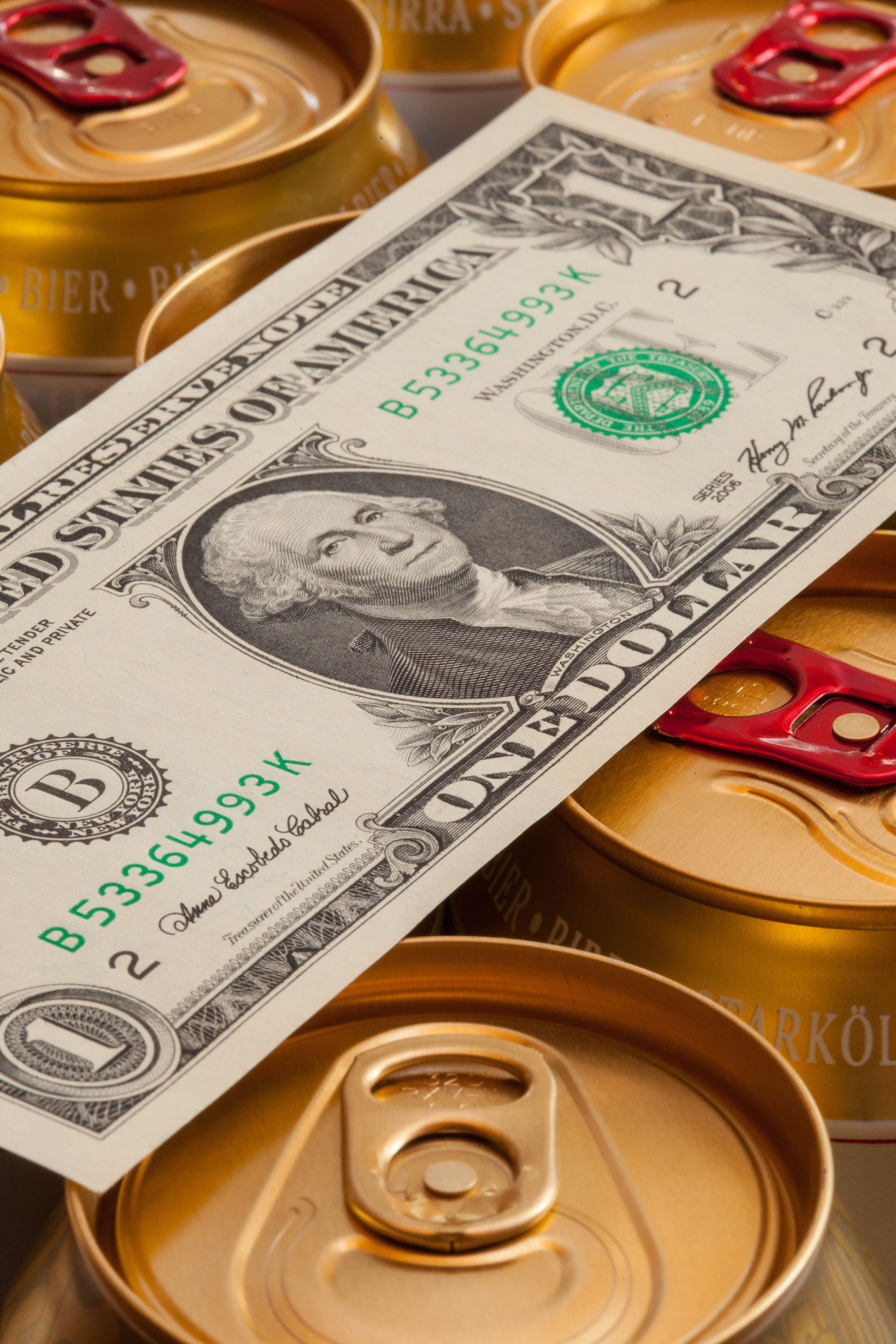To small independent breweries, there are two universal constants: beer and taxes.
According to the Beer Institute, beer is over-taxed, with as much as 40 percent of the pint in your hand going to some form of tax. This makes taxes “the most expensive ingredient in beer today.”
According to the Brewers Association, “the amount of excise taxes paid on beer exceeds the total amount of profit in the brewing industry.”
Ouch.
But what if some of those taxes were eliminated or reduced? There were two bills introduced earlier this year that address this very subject: the Fair BEER (Brewers Excise and Economic Relief) Act and the Small BREW (Brewer Reinvestment and Expanding Workforce) Act.
On the surface, these two bills do essentially the same thing—they lower the tax burden on smaller breweries and free up cash to reinvest in equipment and employees. If passed, would either of these bills lower the price of your favorite pint? Probably not, but their passage could go a long way to help strengthen the craft beer industry.
Let’s look at them both a little closer with the help of the work of Danielle Teagarden on her Brewery Law Blog and Chris Drosner, beer columnist for the Wisconsin State Journal.
Current Legislation
Current legislation offers a lower federal tax to breweries that produce fewer than 2 million barrels per year. Smaller breweries pay $7 on their first 60,000 barrels and $18 on each barrel produced over 60,000. In contrast, breweries that produce more than 2 million barrels per year pay $18 on every barrel.
The Interested Parties
As background, there are two major U.S. beer trade organizations: the Beer Institute and the Brewers Association. Each organization prefers a different bill.
The Beer Institute is a national trade association organized in 1986 to represent the beer industry before Congress, state legislatures and public forums. Board members include representatives from Anheuser-Busch, MillerCoors, Crown Imports, Heineken USA and, in the fifth chair, Rogue Ales.
The Brewers Association, formed in 2005 with a merger of the Association of Brewers and the Brewers Association of America, can trace its roots back to the Small Brewers Committee in 1942. It’s a trade group of more than 1,900 brewers who represent and support the interest of small and independent U.S. breweries.
The Fair BEER Act
The Fair BEER Act, co-sponsored by U.S. Rep Steve Womack (R-Ark.) and Rep. Ron Kind (D-Wis.) and backed by the Beer Institute offers, according to Teagarden, “the most tax advantages to the vast majority of breweries, eliminating federal excise tax completely from typical neighborhood breweries.”
In this scenario, the first 7,143 barrels produced by any brewery are tax-free. The tax on No. 7,144 through 60,000 is $3.50 a barrel. From 60,001 on up to 2 million, the brewery pays $16 per barrel. Any barrel produced beyond 2 million receives the $18 per barrel rate.
Teagarden says that almost all breweries (90 percent) fit into the bottom of the scale and produce less than 7,143 barrels per year.
“This sounds pretty good for all the small breweries and startups out there. Keep in mind that 7,144 barrels per year is more than 137 barrels produced per week,” she says. “That’s a lot of headroom for most of our breweries today. Indeed, likely far more than the wildest dreams of many of the family-owned breweries we’re seeing nestle into our neighborhoods. Just to ground the numbers, that’s more than 13 brew days a week on a 10-barrel system.”
The most notable part of the Fair BEER Act is that all breweries, from the largest to the smallest, will pay less in taxes on their first 2 million barrels of beer.
The Small BREW Act
The Small BREW Act, introduced by representatives Erik Paulsen (R-Minn.) and Richard E. Neal (D-Mass.) and backed by the Brewers Association, concerns small breweries and defines them as those that produce up to 6 million barrels per year. This is an increase from the current standard of 2 million barrels annually. This means that breweries that produce more than 2 million barrels but fewer than 6 million barrels per year can now benefit from a tax cut.
This act calls for a tax of $3.50 per barrel on the first 60,000 barrels, which is half the current rate. A brewer pays $16 per barrel from barrel 60,001 to 1.94 million (2 million barrels total). And then $18 a barrel for everything over 2 million barrels.
Breweries that produce more than 6 million barrels a year pay $18 on each and every barrel without any tax cuts.
Teagarden says for most breweries, federal excise tax would be cut in half. She foresees a lot of savings for the majority of breweries in the United States under the Small BREW Act, but the tax breaks are actually a bit more dramatic under the Fair BEER Act.
Where is the money going?
Chris Drosner writes, “The Beer Institute says the Fair BEER legislation removes ‘barriers to growth’ for all breweries and ‘encourages capital and workforce investment’ through simple, fair and broad reform.”
And that while Fair BEER has been painted broadly as the “Big Beer Bill” in the media, including in this Daily Beast piece, the fewer than 7,144 barrel exemption is an interesting carrot for the smallest brewers. For the largest producers in that category, the change would mean an extra $50,000 a year versus half that savings under Small BREW.
The fact that Anheuser-Busch and Miller will be getting a tax break is one reason the Brewers Association prefers the Small BREW act, but there is another.
According to Scott Metzger, CEO of Freetail Brewing in San Antonio and Brewers Association board member, the Small BREW Act provides tax savings only to domestic breweries that produce fewer than 6 million barrels, whereas the BEER Act gives savings to all breweries from the smallest to the largest, both domestic and foreign.
“So companies like AB InBev get a $4 million bonus sent straight to their headquarters in Belgium,” says Metzger.
Bob Pease, president of the Brewers Association, told the Center for Responsive Politics:
“I’m not sure why the Congress would be interested in providing federal excise tax relief for companies that are not making beer or producing any product in the United States,” Pease said. “All of the savings from the federal excise tax relief of the Small BREW Act would stay in the United States.”
“The Small BREW Act is truly a job creation bill,” says Metzger. “By lowering federal excise taxes on the smallest brewers, they can reinvest those savings into capital enhancements and their respective labor pools to help them continue to grow their businesses. While the large voting members of the Beer Institute have been slashing jobs (AB InBev has cut 5,000 jobs since 2008), small brewers continue to create jobs.”
There’s a third reason the Brewers Association prefers the Small BREW Act, but it’s not so much about what goes into the brewers’ pockets as it is what stays out of the IRS’s.
According to Chris Drosner, there’s a lot at stake for the federal budget. The Brewers Association estimates its preferred Small BREW bill would eliminate $64 million in federal revenue, while Fair BEER would cost more than $150 million. Beer Institute lobbyist Chris Thorne pegs Fair BEER’s cost at $113 million, based on 2013 production numbers. But that’s still nearly twice as much.
Which is the better bill?
The Fair BEER Act lowers taxes on all breweries, both domestic and foreign, and according to Danielle Teagarden, nearly 90 percent of all neighborhood breweries would pay no federal excise taxes as long as they didn’t brew much more than 7,000 barrels per year.
The Small BREW Act only gives tax breaks to eligible U.S. breweries. Eligible breweries are raised from a maximum output of 2 million barrels to 6 million barrels. It also offers no tax breaks to any brewery that produces over 6 million barrels a year.
Both bills are unlikely to lower consumer beer prices, but they could help strengthen the financial position of independent breweries, leading to more quality craft beer being available at more places.
Metzger adds, “Imagine a brewery that will produce around 10,000 barrels this year. The Small BREW Act would provide $35,000 of savings this year that could mean new equipment or employees to help that brewery grow. Now imagine that brewery is growing at a 25 percent rate over the next 5 years. That company will pay $574,492 in excise taxes over five years at current rates. Under the Small BREW Act, that number would be cut in half. I think I speak for all small brewers when I say we would all love to have an extra $290,000 to put into new equipment and more employees.”
Regardless of what bill you prefer, it’s clear both pieces of legislation aim to help small, independent craft brewers. And that is a fight we Beerknurds should take up and support.








